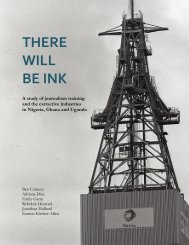Paper - Initiative for Policy Dialogue
Paper - Initiative for Policy Dialogue
Paper - Initiative for Policy Dialogue
You also want an ePaper? Increase the reach of your titles
YUMPU automatically turns print PDFs into web optimized ePapers that Google loves.
38<br />
A World Bank team working on this issue, looking at the experience of several East<br />
Asian countries, found much of relevance <strong>for</strong> Africa in adopting a short-term, quickresults<br />
strategy linked to attracting DFI in non-extractive activities. Singapore provides<br />
an example. The Government invited India’s Tata industries to invest in Singapore and<br />
offered to subsidize or pay <strong>for</strong> the much of the costs of training whilst Tata supplied the<br />
equipment and trainers. It also worked with the French and Japanese governments to<br />
establish an electronics training and a higher technology institute, respectively. Malaysia<br />
and Ireland were also examples of countries that had successfully pursued public-private<br />
partnerships and/or established and subsidized technical training <strong>for</strong> skills needed by the<br />
private sector. In Africa there are beginnings of this type of approach e.g. in Ghana,<br />
Mozambique and Nigeria. There are then the longer-term challenges of raising the quality<br />
of training and relating the supply of trained people to demand <strong>for</strong> them.<br />
International Context<br />
Africa’s development, like that of so many other developing countries, is greatly<br />
affected by globalization: both flows of goods and services, capital, and labor, and ideas<br />
about how development should proceed. “Impact of Globalization and Liberalization on<br />
Africa” is the subject of a wide-ranging review by Jomo and von Arnim. The issues<br />
raised included the problems of declining terms of trade <strong>for</strong> primary exporters (the<br />
Singer-Prebisch thesis); market access; capital outflows, debt, aid and DFI. In their view<br />
globalization and liberalization had not nearly been as beneficial to Africa as they could<br />
have been; indeed it was not entirely clear that their impact on Africa had been positive.<br />
There are two sets of questions: one is how to make the international system more Africafriendly<br />
(e.g. by improving the quality and quantity of aid) and the second is how Africa<br />
should respond to the changing global context. These issues are to be examined further in<br />
the future work of the task <strong>for</strong>ce (see below).<br />
Deepak Nayyar examines the growing importance of China and India as aid and trade<br />
partners of Africa, and the implications <strong>for</strong> Africa of the rising importance of China and<br />
India in the world economy. On the trade front, there are both substantial challenges and<br />
opportunities; they are <strong>for</strong>midable competitors as well as large and growing markets.<br />
VIII. Issues to be Explored and Concluding Comments<br />
The Next Phase<br />
Some issues that are not covered in this volume have been flagged as of particular<br />
importance <strong>for</strong> sustained and equitable growth <strong>for</strong> Africa, and will be covered in a<br />
subsequent volume (reflecting the work of the Africa Task Force in its last meeting, held<br />
in Pretoria). These include, notably those of i) finance; ii) agriculture; iii) climate change;<br />
and iv) aid.<br />
Sustained and reasonably rapid growth is hardly possible without businesses having<br />
adequate access to credit at reasonable real interest rates. The absence of such access to














